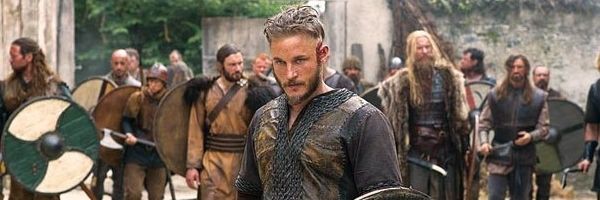Tuesday, April 9, 2013
'Vikings' series on History Channel portrays an Odinic culture: Part 2
This past Sunday was episode six of the nine-part History Channel series 'Vikings'. This episode was entitled 'Burial of the Dead'. This episode finally portrayed the showdown between chieftain Earl Haraldson and Ragnar Lothbrok. Their duel was very emotional and tied all the loose ends. The Earl was on the downside, while Ragnar was injured, so it was evenly matched. The first thing that struck me is that nether man took advantage of the others' bad fortune in the form of broken swords and shields. It didn't feel like "hatred," but pure struggle. When Ragnar was finally victorious, and while the Earl was dying; what struck me much more was the following.. They spoke to each other in a manner of respect, of shared views of the afterlife, and seemingly of tribal goals--almost as though they were still in it together, and it was finally acknowledged that Ragnar would be the one to carry out those plans. Then Ragnar cut the Earl's wrist so he apparently could die a more dignified and quicker death.
Both men were backed by very strong women as wives. Although overcome by sudden emotion when the Earl's wrists were cut, his wife Siggy soon backed Ragnar as the new tribal chieftain--leading a chant for him as everyone went to their knees. As everyone was on the ground, the new chief stood on high, while his wife Lagertha remained standing with a mountain in the background--somehow a symbol reflecting her new status. Just prior to that part, one of the Earl's less-than-savory supporters called for Ragnar to be killed, at which time Ragnar's best friend Rollo stepped up immediately and killed him with an axe. Then immediately Siggy took advantage of the chaos by walking up and stabbing her daughter's very socially-inappropriate new husband---whom had wedded her in a forced and politically-minded marriage--in the gut, killing him as well.
After all that they held Earl Haraldson's "Viking funeral" when they burn a boat at sea with the body. One curious part of that scene is when Siggy asks to light the fire with the torch.. Ragnar decides against this request. It seemed to almost be a way to knock her down a notch. She then stormed off, thinking that she had been shamed and perhaps is no longer welcome to stay; although Rollo later proposes to her. I like that character, and was hoping that she would be retained in some type of role as an elder. Despite Earl Haraldson's earlier aggression, there is some sympathy for him; as this episode portrays him as merely a chieftain engaged in honest evolutionary struggle.. as he passes the torch to Ragnar.
There are a few more thoughts I had regarding his series so far. I think the acting has been excellent. The characters are not only spirited, but there's a deep feeling that they really are those characters. Although there are many characters which have grown within the unfolding of this basically true story; I especially like the performances of Canadian actresses Katheryn Winnick as Lagertha Lothbrok, and Jessalyn Gilsig as Siggy Haraldson. The Lagertha character is very intense, and she really has like a "Viking face." The Siggy character has a lot of substance as well, and she also has a great character face. Apparently great efforts were made for authentic details and realism. If I had even one knit-picky criticism, it might be the small number of warriors brought along for the raids. Would only twenty or so raid a city? Somehow the tribe visually reminds me a little more of perhaps a tribe of Gauls, but how many people would really look like the Vikings of well over a millennium ago?
As the series progressed, there were many more references to Odinic spirituality. The scene in an earlier episode where they attack the English monastery, had strong religious/spiritual/cultural overtones; although the Christian character Athelstan has been treated well. Also, and I could be wrong, but the Floki character seems to be based on the Nordic god Loki. This series could have further seasons, hopefully.
.
Labels:
European history,
Middle Ages,
Odinism,
Scandinavia,
Vikings
Subscribe to:
Post Comments (Atom)


No comments:
Post a Comment